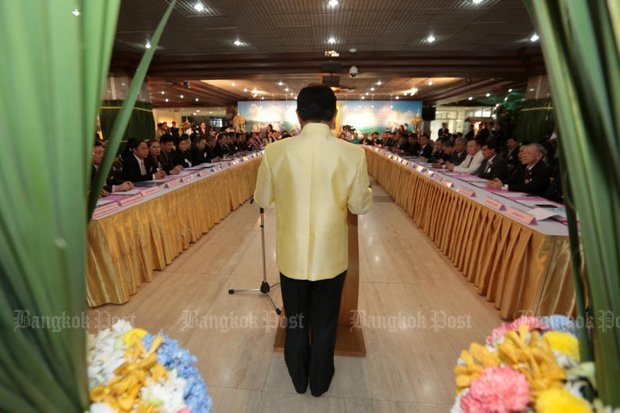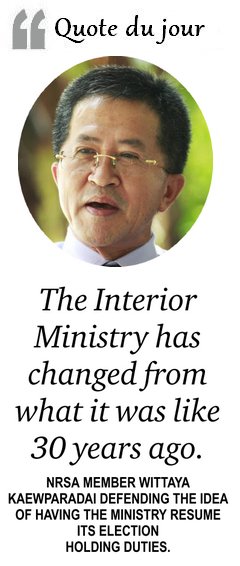
Two major political parties on Monday slammed a reform panel over proposals seen as a move to realign political affiliations before a general election and guarantee the regime retains its hold on power.
The proposals came from the National Reform Steering Assembly's (NRSA) panel on political reform and suggested the drafting of four organic laws in the new charter.
One involved overhauling membership of political parties by requiring their current members to re-register, known as the "set-zero" approach.
The other called for the involvement of the National Council for Peace and Order (NCPO) and the Interior Ministry, alongside the Election Commission, in organising the general election expected at the end of next year.
Critics say the move is possibly intended to manipulate election results.
The NRSA panel will finalise the proposal today.

Democrat deputy leader Sathit Pitudecha lambasted the proposed party membership overhaul, saying it would undermine the democratic system.
Under the proposal, party members would be required to pay an annual membership fee of 200 baht.
According to Mr Sathit, the Democrat Party has worked hard to build its political base.
"The people who came up with the proposal may see this as a way to create equality and increase small- and medium-sized political parties. But it will disrupt the dynamics of a long-established party," he said.
He said subsidies from the EC were based on the number of political branches it had and the number of House seats it won, while another party -- apparently Pheu Thai -- received funds based on the seats it won.
According to Mr Sathit, despite a big difference in the number of House seats, both parties were allocated about the same amount in subsidies.
Pheu Thai acting deputy spokesman Anusorn Iamsa-ard described the move as "expected", saying the so-called "five-river organisations" were doing their part to keep the military in power.
He said that a series of proposals and moves including Paiboon Nititawan's plan to set up a political party to contest the next general election indicated that the regime was manoeuvring for a political advantage.
Mr Paiboon, member of the defunct National Reform Council (NRC), announced he would set up a party to back Prime Minister Prayut Chan-o-cha becoming the prime minister after the next general election.
"Pheu Thai isn't surprised by 'set-zero'. You have to ask the Democrat Party which has been around for over 60 years and has millions of members," he said.
Pheu Thai member Supol Fongngam expressed concern Monday about the "return" of the Interior Ministry to organising elections, saying the EC was introduced to take over management of elections from the ministry.
Under the proposal, the EC's provincial election offices would be dissolved and the EC would be given authority to order soldiers, police and local authorities to support it during elections.
"How could you guarantee transparency after dissolving the provincial election offices? Do you want the NCPO to step in? That's impossible to do because they have a conflict of interest. They can't organise elections," he said.
Mr Supol voiced disagreement with a suggestion that government officials who fail to vote should face harsher penalties than the public.
He said voting was a right, so it would be inappropriate to deal with state officials differently from other voters.
However, Mr Supol voiced support for overhauling the membership of political parties to solve the problem of duplicating membership. He said there was no need to worry about political parties being unable to recruit members as they already had a political base.
Wanchai Sornsiri, an NRSA panel on political reform member, defended the proposal, saying it did not call for the NCPO to oversee elections.
He said the suggestion was for the NCPO to support the work of the EC to ensure that the next general election would not be a failure.
He denied that NRSA members were trying to appease the NCPO.
Witthaya Kaewparadai, an NRSA member, said he was the one who suggested that the Interior Ministry and the NCPO be brought in to help with the polls.
He said the EC had failed to address election fraud over the years because it had too much on its hands.
According to Mr Witthaya, his proposal called for the Interior Ministry to organise elections while the EC would supervise.
Seree Suwanpanont, head of the NRSA's political reform committee, said the controversial proposals would be up for debate today.
"We're listening to criticism and if it's reasonable we are ready to make revisions. These proposals aren't to please the NCPO. They are not contesting elections. We aren't doing what the politicians are accusing us of. It's something that should happen in the country."
National Legislative Assembly member Somchai Sawangkarn said these proposals were not finalised and they would have to be reviewed by the Constitution Drafting Committee and NLA.